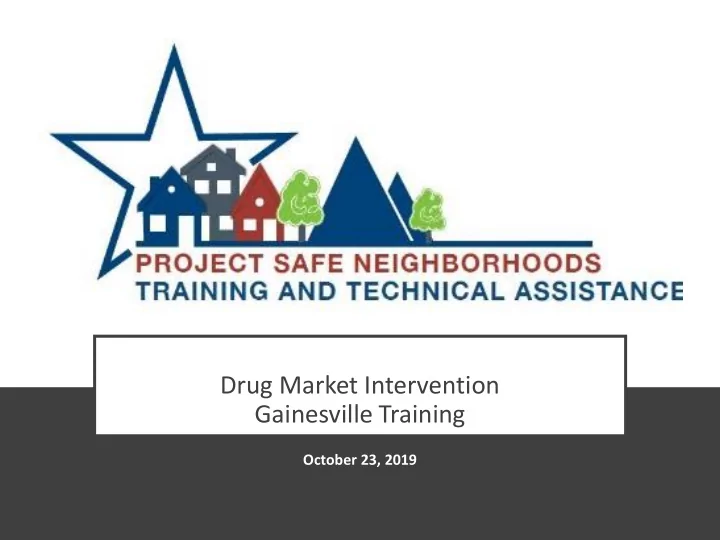

Drug Market Intervention Gainesville Training October 23, 2019
Why A DMI • Eliminate open-air drug dealing • Remove the chaos and violence • Reset community norms and enhance safety • Strengthen community and law enforcement partnerships
Why A DMI • Changed communities – Atlanta, Damascus Gardens, High Point Rockford, Seattle • An evidence-based strategy – Crimesolutions.gov – https://psn.cj.msu.edu/tta/resources.html – Data driven, focused deterrence, team approach
The DMI CORE TEAM • Law Enforcement – Local, state and federal • Prosecution – Local, state and federal • Community – Leadership, faith, and business • Social Service Providers
The Nine Steps of a DMI 1. Crime Mapping 2. Survey of Intelligence Available 3. Incident Reviews 4. Undercover Operations 5. Mobilize Community Commitment 6. Contact with candidate’s influentials 7. Call-in/Notification 8. Enforcement and Community Empowerment 9. Follow Through and Evaluation
Components of a DMI • Open-air, illegal drug markets are identified through citizen complaints, police calls for service, police street knowledge, and crime data. • Undercover law enforcement operations to identify active drug dealers. • Identified dealers are categorized based on criteria such as volume of sales, previous violent and/or gun histories (high risk sellers=A Listers); smaller amounts, non-violent histories (low risk sellers=B Listers). • The team contacts B List influentials. • A Call-in is held for B list candidates. • Enforcement coupled with community empowerment and neighborhood enhancements. • Continued communication with the candidates, community, and an evaluation
LE Roles • Use of law enforcement data and intelligence to select a DMI focus area • Undercover law enforcement operations to identify active drug dealers • Determine A List and B List candidates • Contact B List influentials • Organize and speak at the Call-in for B list candidates • Enforcement and response post-call-in • Continued communication with the candidates, prosecution, social services and community
Prosecution Roles • Agree to hold cases for B List candidates • Determine A List and B List candidates • Seek to prosecute A List candidates to the fullest extent through coordinated efforts between state/federal/local authorities • Attend and speak at the Call-in for B list candidates • Continued communication with the candidates, community, social services and law enforcement
Community Roles • Build support for the DMI with other members and social services • Input on A List and B List candidates • Assist contact withB List influentials • Attend and speak at the Call-in for B list candidates • Continued communication with the candidates, prosecution, social services and law enforcement
Social Service Roles • Attend Call-in for B List candidates • Provide referrals for such social services as: – State provided benefits assistance – Drug treatment, mental health, and alcohol treatment services – Basic health services – Employment and pre-employment services – Life skills and mentoring services – Day care and family care services – Housing assistance – Faith based organization assistance • Continued communication with the candidates, community, prosecution and law enforcement
Do What You Say • Following the Call-in , the team works together to ensure the market doesn’t reinitiate, that candidates get referrals for requested help, and that anyone who appears to not get the message is dealt with immediately. • The effort is also monitored by evaluating its impacts on crime data, “marker” offenses, and citizen input.
Results • Community and the police report that the market immediately collapses • When implemented with fidelity, teams tend to be willing to continue with other DMIs or strategies • Long term impact • It’s a new day! We do NOT allow open -air drug markets in OUR neighborhood
Q&A It’s Time for Questions!
Ed Copeland: kecjd@mac.com Bob Hood: Robert.hood@apainc.org Heather Perez: perezh@msu.edu Drug Market Intervention Gainesville Training October 23, 2019
Recommend
More recommend